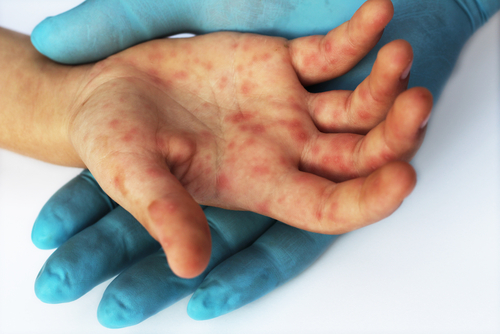
Information for Parents
Hand, foot and mouth disease (HFMD) is usually a short mild illness that mainly affects children. It is most commonly caused by the Coxsackie virus.
Most children fully recover within ten days. Serious complications occur rarely.
What are the symptoms of Hand Foot and Mouth Disease?
HFMD most commonly affects children under 10 years of age. Older children tend to develop a milder form of the illness.
The illness often starts with a high temperature (fever) followed by a sore throat then small spots inside the mouth. These progress into small mouth ulcers. Spots may appear around the mouth and on the skin, usually on the hands and feet. Spots sometimes also appear on the buttocks, legs and genitals. They are not usually itchy but sometimes can be a little bit sore.
The high temperature (fever) and spots usually clear within a few days. The mouth ulcers can be painful and may last up to a week.
In a very small number of cases, the virus affects the heart, lung or brain to cause inflammation.
What do I need to know?
The aim of treatment is to ease symptoms and help your child be comfortable until the illness goes away.
Soft foods may be easier to eat with a sore mouth. Try foods such as soups, ice cream, smoothies and mashed potato.
HFMD is contagious. The incubation period is 3-5 days. This means it takes 3-5 days to develop symptoms after being infected. Most cases are passed on by coughing and sneezing which transmits the virus into the air. It can also be passed on by touching the fluid in the blisters. The virus can also be passed in stools (faeces).
HFMD is mainly infectious until the spots and mouth ulcers have gone. However, children can still be mildly infectious for several weeks longer, as the virus may be passed out with the faeces for several weeks.
It is sensible to maintain good hygiene to reduce the chance of passing on the virus. For example:
Guidance from Public Health England is that children can return to school if they are well enough to attend. Although there is a risk of passing it on to others, the illness is usually mild.
When to be concerned
You should return to The Children’s Urgent Care Centre (0800-2000 Monday-Sunday) or Accident and Emergency (out of hours) if your child has any of the following symptoms:
Further Information
If you need any more information or advice between the hours of 0800-2000 Monday-Sunday please call The Children’s Urgent Care Centre on 02073906150.
Out of hours please contact NHS 111.
Call NHS 111 if you need medical help fast, but its not life threatening- for example, if you:
In case of emergency please call 999 or attend your local Children’s Emergency Department.